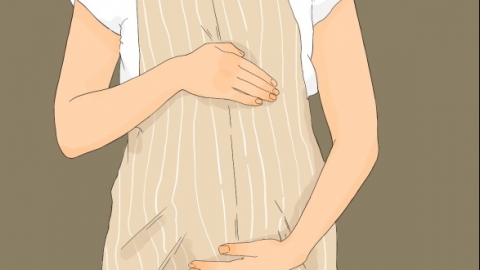Why does a pregnant woman's belly feel tight and hard when she walks around, and what should be done about it?
When a pregnant woman walks, her belly may feel tight and hard, which could be caused by false labor contractions, uterine enlargement and stretching, fatigue or overexertion, intestinal spasms, or preterm labor signs. This can be improved through rest, adjusting activity levels, keeping the abdomen warm, and medical intervention if necessary. If severe pain or vaginal bleeding occurs, prompt medical attention is required.
1. False Labor Contractions (Braxton Hicks): During pregnancy, the uterus becomes more sensitive. Movement during walking may trigger these contractions, causing irregular tightening and hardening of the belly without significant pain. It is recommended to immediately stop physical activity, sit or lie down to rest, and take slow, deep breaths to relax the body.
2. Uterine Enlargement and Stretching: As gestational age increases, the uterus grows larger, stretching the surrounding ligaments during walking, leading to a sensation of abdominal tightness, possibly accompanied by mild dull abdominal pain. It is advised to walk slowly, avoid sudden twisting or bending movements, and minimize strain on the ligaments.

3. Fatigue or Overexertion: Walking too long or too fast can lead to excessive physical exhaustion, triggering abdominal tightness and hardness, possibly accompanied by fatigue and lower back soreness. It is recommended to limit walking sessions to 15–20 minutes, choose flat and even routes, and take breaks whenever feeling tired.
4. Intestinal Spasms: Abdominal cooling or improper diet before walking may cause spasms of the intestinal smooth muscles, resulting in abdominal tightness and hardness along with intermittent abdominal pain and bloating. Keep the abdomen warm, avoid raw, cold, or gas-producing foods before walking, and stop to rest if discomfort occurs.
5. Preterm Labor: Occurring before 37 weeks of pregnancy, this involves regular uterine contractions that worsen after walking, with the abdomen becoming tight and hard, accompanied by a sensation of pelvic pressure or lower abdominal pain, and possibly a small amount of vaginal discharge. It is recommended to seek medical guidance for treatment with medications such as ritodrine tablets, atosiban injection, or magnesium sulfate injection to manage symptoms.
In daily life, it is advisable to keep the abdomen warm, wear comfortable and loose clothing, perform light warm-up exercises before walking, consume warm and easily digestible meals, and adjust activity levels flexibly according to physical condition, supporting a healthy and stable pregnancy.







